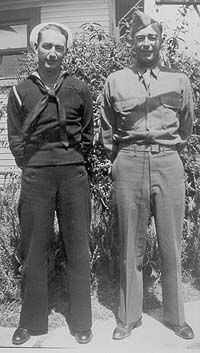| Daniel and Owen Price |
“If everybody is trying to avoid the draft, who is going to win this war?” were words spoken by Owen Price during the first part of World War II as his boss informed him of being put on the critical war effort list so he couldn’t be drafted. Soon after that, his draft notice came and he was shipped overseas. “When I returned, I was glad I had the chance to defend this country,” Owen said.
During his first year following the draft, he was trained at Camp Collin, Calif. and Fort Bliss, Texas. He received training on rifles and anti-aircraft guns, with an extensive two week infantry training at Camp Maxy, Texas.
In his early training, Owen met a young sergeant whose name was John Claus. Sgt. Claus spoke fluent German and enabled his group to take many prisoners, and save many American lives. Sgt. Claus assigned Owen to the azimuth position on a 90 mm anti-aircraft gun. This became his attachment to the 161st Field Artillery Battalion, a part of the 35th Infantry Division.
Owen arrived at the scene of the Battle of the Bulge, which was then in its final stages. Following the completion of this battle, he was sent north with the 35th to relieve the Ninth Army British Brigade in a very heavily mined area. “It was impossible to go on foot off the road without a mine detector,” stated Owen. “Some of the Germans were killed by their own mines, even as they were planting them.”
In February of 1945, he was in Randarth as the Germans bombarded the town heavily. Many of the soldiers were killed or wounded. Their mission in Randarth was to support the crossing of the Roer River, but a dam break upstream flooded the valley and postponed the crossing until later in the month. During his time in Randarth, Owen met a soldier who was an engineer named John Pepperakis. After the war, Pepperakis came to Sunnyside, Utah, and the two worked together in the mines and on construction projects in the Sunnyside area.
Firing in preparation for the Rhine Crossing began on March 24, 1945. Following heavy fighting and many attempts to blow up the bridge to prevent the crossing, in the early morning hours of March 25, they were able to cross the bridge and found many white flags waving in surrender. “Our soldiers liberated several concentration camps and saw horrible things they could never forget,” Owen stated.
From the banks of Normandy where he began, to the banks of the Elbe River, Owen’s group of soldiers had covered 1,525 miles in combat in almost 10 months.
His European Theater of Operations ribbon had acquired five bronze stars during this time. In early May, the 161st was sent to occupation duty near Hanover, Germany. In July, the first steps on the road home were taken as the battalion was moved into France. While on a 10 day pass in London, awaiting a boat to the Pacific Theater, word came of the bombing of Hiroshima. The war was over.
Owen’s battalion was indeed loaded onto a ship, but this ship brought them into the New York harbor, past the Statue of Liberty, and on their way home to their families. He was very glad to be home again with his wife and two young children.

